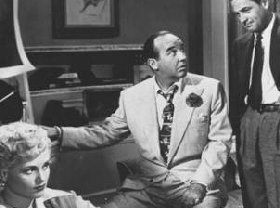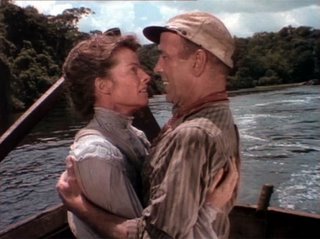
Before the fit reclaims me--I've recently seen Onibaba and 2001, again--and I get that glazed look that comes from gazing, I will stand in the good company of, as Michael Chabon attempted to revive in his 2003 anthology, McSweeney's Mammoth Treasury of Thrilling Tales, the plotted genre story. In his introduction, Chabon rankles at the post-1950 short story, "plotless and sparkling with epiphanic dew." He admits he's part of the problem, but the anthology he edited aimed to clean that amorphous smudge on fiction's sleeve. The result is not quite what I hoped for, but I admire the resolve. Besides, if Chabon didn't quite get it right, it's already all out there, in musty paperbacks with quaintly low prices printed sideways on covers promising "masterpieces" and "treasuries," in which Saki's open window looks out on Henry James' tree of knowledge, and John Cheever's enormous radio can be heard in the next apartment, while Walter Mitty and a Bradbury carnival dwarf lean against the wall of Ring Lardner's Liberty Hall--and always, somewhere out there steaming in wet heat, waits Joseph Conrad's outpost of progress, as lonely and final as any Clifford D. Simak huddling place.
It was in this mood hungry for exposition, complication, tension, conflict, climax, and abrupt or lingering resolution that I watched The African Queen and Born Yesterday; and, as character-driven as these two are, their success still depends on the fruits of genre, of the tensions of adventure and romance, the humor and glory of incongruous characters and motivations shedding their differences to triumph against a common enemy--German soldiers or gangsters--and win each others' hearts--and, obviously, the viewers', in story turns and twists that are satisfying and endearing.
 As I did with the film I wrote about yesterday, You Can Count on Me, I should note that these movies work not just because of the writing but the acting. Bogart, Katherine Hepburn, Judy Holliday, William Holden, and Broderick Crawford approach the material with open arms, glad to ham it up as the plot sweeps us all along. I watched The African Queen with teenagers in the room; they snickered at the lame special effects and rolled faux-sophisticated eyes at the actors' declamatory delivery. Oh, the price exacted by the post-Method world. They missed what was being offered: a thrilling tale, with leeches and hippos and crazy love, jury-rigged propellers and torpedoes, banging along like a downhill wagon. Born Yesterday, despite its staginess and civics lessons, also careens wildly, especially in those exchanges between Holliday and Crawford, dueling as characters and actors, a joy to hear.
As I did with the film I wrote about yesterday, You Can Count on Me, I should note that these movies work not just because of the writing but the acting. Bogart, Katherine Hepburn, Judy Holliday, William Holden, and Broderick Crawford approach the material with open arms, glad to ham it up as the plot sweeps us all along. I watched The African Queen with teenagers in the room; they snickered at the lame special effects and rolled faux-sophisticated eyes at the actors' declamatory delivery. Oh, the price exacted by the post-Method world. They missed what was being offered: a thrilling tale, with leeches and hippos and crazy love, jury-rigged propellers and torpedoes, banging along like a downhill wagon. Born Yesterday, despite its staginess and civics lessons, also careens wildly, especially in those exchanges between Holliday and Crawford, dueling as characters and actors, a joy to hear. Those two movies essentially reject the visual center of their medium--and this is true even of The African Queen, despite its exotic locale--as both directors lean the camera forward to hear every conversation, to examine the mechanisms of survival and the succor of affection. I can feel my foot slide to the essentially visual experience--and I am not sorry; it is the deepest well of my love for movies, cool water raised up from the dark to sparkle, epiphanically or not. In the meantime, I'm happy to be given the sustenance of character and plot--and to remind myself that the best movies draw it all in, until sight, sound, and narrative line run like a floodtide river, roiling and overwhelming.
Those two movies essentially reject the visual center of their medium--and this is true even of The African Queen, despite its exotic locale--as both directors lean the camera forward to hear every conversation, to examine the mechanisms of survival and the succor of affection. I can feel my foot slide to the essentially visual experience--and I am not sorry; it is the deepest well of my love for movies, cool water raised up from the dark to sparkle, epiphanically or not. In the meantime, I'm happy to be given the sustenance of character and plot--and to remind myself that the best movies draw it all in, until sight, sound, and narrative line run like a floodtide river, roiling and overwhelming.
No comments:
Post a Comment